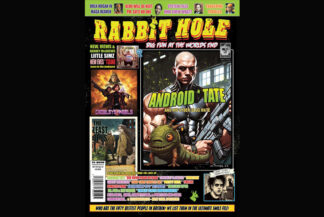6. Stewart Lee
The Reluctant Genius of Comedy
Stewart Lee has built a career unlike any other in British comedy: uncompromising, cerebral, self-aware, and yet consistently hilarious. Born in Shropshire in 1968 and raised in Birmingham, Lee studied English at Oxford before launching into stand-up in the late 1980s. From the very beginning, his comedy was different — less about quick gags, more about dismantling the very idea of stand-up while still delivering belly laughs.
He first found widespread attention as part of the double act Lee and Herring, alongside Richard Herring, in the 1990s. Their BBC shows, Fist of Fun and This Morning with Richard Not Judy, became cult favourites, mixing surreal sketches with wry, knowing humour. But it was in solo work that Lee truly defined himself as one of the most original voices in British comedy.
His stand-up is meticulously crafted, often playing with repetition, timing, and silence in ways that defy convention. He deconstructs jokes in real time, mocks audience expectations, and revels in the absurdity of performance itself. Yet beneath the meta-commentary lies real substance: biting satire of politics, media, and modern life. From skewering right-wing rhetoric to lampooning the commodification of culture, Lee’s comedy always has something to say.
Television brought him to wider fame through Stewart Lee’s Comedy Vehicle (2009–2016), a series that pushed the limits of what stand-up on TV could be. Each episode was a masterclass in form and content, combining long-form routines with interjections from Chris Morris as a mock interrogator. It won critical acclaim, awards, and cemented Lee’s reputation as a comic genius who refused to compromise.
Lee has also been influential off the stage. He co-wrote the hit musical Jerry Springer: The Opera (2003), which caused both acclaim and controversy, winning Olivier Awards while provoking protests. He is a prolific writer, with collections of essays and reviews that demonstrate the same sharp intelligence as his stand-up. His columns in The Observer have further showcased his wit, often blurring the line between parody and polemic.
What makes Stewart Lee so remarkable is his duality. He is both highbrow and earthy, intellectual and silly, confrontational and strangely comforting. He delights in frustrating audiences even as he wins their laughter, creating a space where comedy feels alive, unpredictable, and vital.
For many comedians, Lee is the gold standard — a craftsman who treats stand-up as an art form rather than mere entertainment. Yet he has never lost his ability to connect with audiences, whether through political anger, nostalgic reflections, or surreal flights of fancy.
At #6, Stewart Lee stands as proof that comedy can be both clever and gut-punch funny, both experimental and timeless. He is a comic genius who has made difficulty delightful, and who continues to inspire, provoke, and entertain in equal measure.



